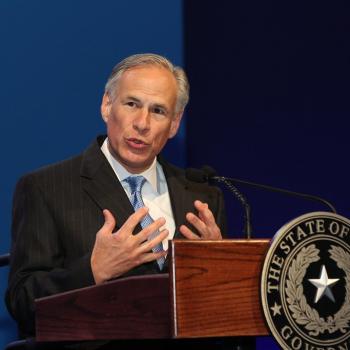
Jesus warned against those who like to emphasize and promote rigorous legalism while acting contrary to the rules they use to control the people. He indicated that they were hypocrites who, despite trying to hide their hypocrisy, could only do so for so long before their it is revealed:
Beware of the leaven of the Pharisees, which is hypocrisy. Nothing is covered up that will not be revealed, or hidden that will not be known. Therefore whatever you have said in the dark shall be heard in the light, and what you have whispered in private rooms shall be proclaimed upon the housetops (Lk. 12:1-3 RSV).
Those who like to embrace power for their own gain, using the pretense of being religiously pious as a way to achieve power, risk having their hypocrisy exposed. When it is revealed, they will have to deal with the fallout of that exposure. While some might shrug off such hypocrisy, we should not do so. Those who show themselves so dishonest should not be give any power in secular society. This is because their interest is not in the common good, nor in any objective good, but in their own personal gain. They will use and abuse particular notions of the good for their own sake, pretending, by doing so, that they are on the side of the good, but when confronted by what they have done, and how and why they act contrary to their own rhetoric, they will try to find a way to maintain the power they have attained. To do so, they will ask for the mercy which they have been unwilling to give to others. They will say that they have or will change, and that should be good enough. However, the way they have treated or treat others who make similar mistakes should serve as a warning; their concern remains for their own private gain, and they are willing to do anything to achieve their desires.
This is one of the many problems we find with most of those who run for office as pro-life candidates. Their interest, at best, is not in the dignity of life, but in abortion, and even then, many of them really do not care about abortion but just say what they think their followers want to hear. They do not want society to consider the root causes for abortions, nor to deal with those causes, for that often means they would have to promote initiatives which run contrary to either their ideology or their pursuit for power. Thus, few of them are concerned with health care, promoting living wages, eliminating racism or sexism, or similar such issues which, if properly dealt with, could and would lead to the lessening of abortions in society. And, as they tend to reject universal health care and the elimination of the death penalty, such politicians reveal that they do not really consider life to be invaluable, but rather, they find it rather cheap, and something easily ignored. Without holding a consistent ethic underlying their opposition to abortion, they show us that their concern is not in the protection of life, despite what they say, but power, and they will use people’s fears and concerns as a way to gain their support. They tend to be sophists, saying what they think their followers want to hear, but never believing it themselves. This is why they don’t do as they speak, and in this way, combine the worst aspects of religion and politics, seeking power to lord it over others, using elements of the good as a way to bolster support for their evil ways. Jesus properly warned us not to act like this:
But Jesus called them to him and said, “You know that the rulers of the Gentiles lord it over them, and their great men exercise authority over them. It shall not be so among you; but whoever would be great among you must be your servant, and whoever would be first among you must be your slave; even as the Son of man came not to be served but to serve, and to give his life as a ransom for many. (Matt. 20:25-28 RSV).
Ever since supposed pro-life influencers promoted Scott Brown, it should have been clear, they are not concerned with life. They use pro-life rhetoric as a means of gaining political power for Republicans.[1] The same people who say abortion is murder, and those involved with a particular abortion should be punished, are the same people who say people can change, and those who were involved with abortions in the past should not be held responsible for what they have done if they now claim to be pro-life. This is why they do not suggest Abby Johnson should be imprisoned, even as to why there is a collective shrug with the notion that Herschel Walker might have made his girlfriend have an abortion. On the other hand, if a normal woman has a miscarriage, they have no difficulty requiring her to prove it was a miscarriage or else face punishment. Women, moreover, who have a medical reason to have an abortion, likewise, will have their lives put at risk as they have to prove the necessity for the abortion. The hypocrisy is real, but it also stands to reason it reveals that they have no real concern for abortion, but rather, the desire to find another way to penalize and punish those they dislike as well as to find a way to exercise greater control over society.
It’s not just abortion. Abortion is just one example of the way such hypocrisy is at work in American politics. Thus, many on the right, following culture war narratives, have also wanted to penalize gays while being gay themselves, something which Michael Rogers talked about years ago:
For years, I had known of prominent gay politicians who were in the closet but worked for homophobic causes in the interest, it seemed to me, of their political careers. And so, drawing on sources within and outside Washington, I began using my blog to expose these congressmen and their high-profile staffers. A media frenzy ensued. Within two days of the site’s launch, the Washington Post published one article; another followed just six days later. Local and national television outlets called, challenging me to defend and explain my actions. In one early interview, Bill O’Reilly said to me, “People’s sex life should have nothing to do with any kind of a policy.”[2]
Pope Francis understands what is going on with such hypocrisy:
When we say, “Be careful, that person is a hypocrite”, what are we trying to say? What is hypocrisy? It can be called the fear of the truth. Hypocrites are afraid of the truth. They prefer to pretend rather than be themselves.[3]
Hypocritical politicians, politicians who pretend to be something they are not, certainly are afraid of the public finding out what are. They know, if their true way of life is revealed, they risk suffering the way they have made others suffer, even as they might lose power and authority, as the people they used to get such power might turn on them. If, on the other hand, if many, if not most, of their followers do not really believe the ideology they present to the public, but only use it as a way to pretend they hold some objective moral principles as a way to denigrate their opponents, then that, too, is something they are afraid to have revealed. For then, it will be clear, they are nihilistic sophists who will say and do anything for power. No one who wants power for the sake of personal gain, and who holds no objective values, should be given such power. Those who would tell us not to be concerned when someone is revealed to be a hypocrite, those who would say we should show mercy to those who made mistakes in the past, while not being willing to give the same mercy to others, also tell us who and what they are, and that is hypocrites who likes to lord it over others. When confronted with their own policies, they try to run far away from them themselves. And if they run away so quickly away from them, so should we.
[1] In actuality, it should have been obvious even before Brown was promoted, but with Brown, it became much clearer, and that much harder to dispute.
[2] Michael Rogers, “Why I Outed Gay Republicans” in Politico (6-26-2014).
[3] Pope Francis, “General Audience, August 25, 2021.” Vatican translation.
Stay in touch! Like A Little Bit of Nothing on Facebook.
If you liked what you read, please consider sharing it with your friends and family!

















